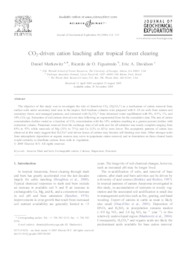CO2-driven cation leaching after tropical forest clearing.
CO2-driven cation leaching after tropical forest clearing.
Author(s): MARKEWITZ, D.; FIGUEIREDO, R. de O.; DAVIDSON, E. A.
Summary: The objective of this study was to investigate the role of dissolved CO2 (H2CO3*) as a mechanism of cation removal from surface soils under secondary land uses in the tropics. Soil leachate columns were prepared with 0?10 cm soils from mature and secondary forest, and managed pastures, and extracted with H2CO3* from deionized water equilibrated with 0%, 0.5%, 1%, and 10% CO2 (g). Extraction of soil cations slowed over time following an exponential form for the cumulative data. The rate of cation concentration decline varied as a function of CO2 concentration with the 10% solution resulting in a greater percent decline with extraction volume. Potassium removal from the exchange sites of all soils and for all solutions was nearly complete ranging from 85% to 97% while removals of Mg (31% to 71%) and Ca (12% to 42%) were lower. The asymptotic patterns of cation loss observed in this study suggest that H2CO3* acid-driven losses of cations may become self-limiting over time. Other stronger acids from atmospheric deposition or organic sources may serve to perpetuate cation removal, and re-forestation on these cleared lands would certainly re-distribute cations from soils to vegetation.
Publication year: 2006
Types of publication: Journal article
Unit: Embrapa Eastern Amazon
Observation
Some of Embrapa's publications are published as ePub files. To read them, use or download one of the following free software options to your computer or mobile device. Android: Google Play Books; IOS: iBooks; Windows and Linux: Calibre.
Access other publications
Access the Agricultural Research Database (BDPA) to consult Embrapa's full library collection and records.
Visit Embrapa Bookstore to purchase books and other publications sold by Embrapa.

